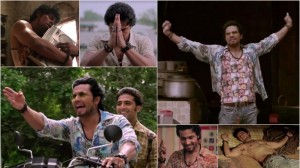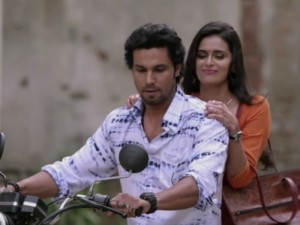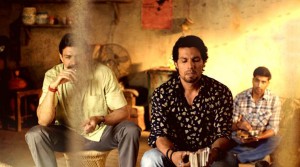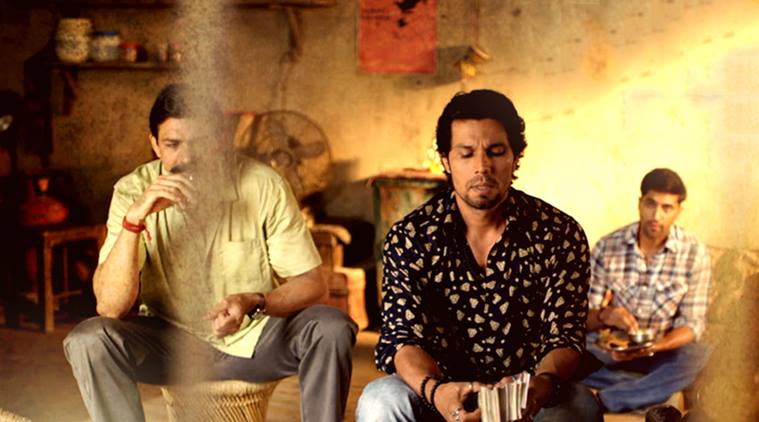Director: Syed Ahmad Afzal

What an intriguing time for Hindi cinema — or more precisely, its intensely distinct hues, backdrops and languages. While most stories and their structures still have some way to go, there has never been a more fertile time to get certain regions, their sins and ways, and hitherto unknown small-town (or even urban) tidbits into the spotlight. We learned some about sperm donation in ‘Vicky Donor’, the “business” of sainthood in ‘Global Baba’, organ trafficking in ‘Rocky Handsome’, drug mules in the unreleased ‘Peddlers’, child trafficking in ‘Mardaani’, a corpse-burning community in ‘Masaan’, the coal mafia in ‘Gangs Of Wasseypur’, car-jacking hooliganism in ‘Titli’ and marijuana planting in ‘The Blueberry Hunt’. I’m not mentioning Madhur Bhandarkar and his “real” explorations here, because his universes form the ‘alleged’ foregrounds.
Laal Rang, too, fascinates with its choice of environment. Focused on faces we may have skimmed over at the bottom corners of national newspapers – illegal blood trade rackets – the film boasts of Karnal-based characters shaped by this “underground” lifestyle, and vice versa.
Shankar (Randeep Hooda), an established “blood-bank king” captures the imagination of a naïve student named Rajesh (a light-eyed, boyish Akshay Oberoi) at a diploma course in medical lab technology. Fresh-faced Rajesh seeks a secure ‘sarkaari’ future, but is seduced by Shankar’s legend and sense of myth. It’s more than just Shankar’s neat wheels or his contacts and Godly status – the Yamaha RX100 bike, an ultimate campus status symbol. The first time Rajesh rides pillion, one can sense peculiar homoerotic chemistry, if only one-sided, a hypnotic slow-mo tone-setting scene on its own. He further gets taken in by the way Shankar seems to have painstakingly created a labyrinth network of desperate donors, suppliers and a pro-smuggler into and from the cities (a vampirish pale dude nicknamed ‘Dilli Ka Dracula’; eerie)
 Perhaps the director deliberately pinpoints such moments like the bike ride, to suggest the beginning and end of crucial connections and phases. This is clearly evident from French composer Mathias Duplessy’s (Finding Fanny) eclectic and paradoxical interpretation of on-screen drama. His music evokes several famous sounds throughout the film, at times inserted simply to elevate a routine action or glance or strides – from Motorcycle Diaries’ guitar-heavy journeyman themes, to a clear influence of Shigeru Umebayashi’s lilting ballads from ‘In The Mood For Love’ and ‘A Single Man’. (The scene where a grieving Colin Firth drives past — and peers at — a neighbour’s boy in the lawn in slow-mo to this music, comes to mind)
Perhaps the director deliberately pinpoints such moments like the bike ride, to suggest the beginning and end of crucial connections and phases. This is clearly evident from French composer Mathias Duplessy’s (Finding Fanny) eclectic and paradoxical interpretation of on-screen drama. His music evokes several famous sounds throughout the film, at times inserted simply to elevate a routine action or glance or strides – from Motorcycle Diaries’ guitar-heavy journeyman themes, to a clear influence of Shigeru Umebayashi’s lilting ballads from ‘In The Mood For Love’ and ‘A Single Man’. (The scene where a grieving Colin Firth drives past — and peers at — a neighbour’s boy in the lawn in slow-mo to this music, comes to mind)
Like most mainstream Indian films, Laal Rang is often guilty of background score overkill but Duplessy’s strings and Vipin Patwa’s (Bollywood Diaries) compositions make it a deliberate language. They don’t pretend to tell us things through it, they simply put it for stylistic and artistic vibrancy. This visibly lends a moody, and almost dystopian, flavour to this secret, taboo landscape. For instance, when the very emotional ‘Aye Khuda’ plays towards the end, you realise that it’s more of a coming-full-circle moment, what with Shankar again riding his bike with Rajesh riding pillion, but in an entirely different situation, heading towards possible doom. It could have well been a silent scene of regret and introspection, of quiet and distance, but nobody begrudges the filmmakers’ decision to amp up the “internal drama” many notches. The lyrics, eventually, do their job.
Things do get messy, both in life and plot, soon after Rajesh voluntarily embraces the get-rich-quick path through Shankar’s interminable blood line. His sudden advent of greed seems scripted and not totally organic, when becomes Shankar’s careless pretender and “competitor” to fund his upcoming wedding with spunky college colleague Poonam (an electric Piaa Bajpai; could have done without those obvious “weak in Englisss” linguistic quirks).
 Director Syed Ahmad Afzal doesn’t shy away from using vast Shakespearean strokes to make this subject more accessible – the rise and fall of the community, small-town romances, the classic guru-chela bromance, inevitable rifts, persistent cops (Rajneesh Duggal; another hinterland attempt after ‘Direct Ishq’), abrupt song snippets interrupting the narrative and truly senile frame rates.
Director Syed Ahmad Afzal doesn’t shy away from using vast Shakespearean strokes to make this subject more accessible – the rise and fall of the community, small-town romances, the classic guru-chela bromance, inevitable rifts, persistent cops (Rajneesh Duggal; another hinterland attempt after ‘Direct Ishq’), abrupt song snippets interrupting the narrative and truly senile frame rates.
Perhaps the reason this stands out is its whole-hearted commitment to storytelling. There’s something oddly hypnotic about its texture. It swings, and misses a lot (ill-placed songs, Shankar’s deformed love track, voiceovers, meandering and long drunk conversations), but comes around to recognising its real essence. Beneath the surface of its narrative politics, lies a simple operatic tale about a misguided boy and his tragic mentor.
Randeep Hooda has mastered the unrequited chuckles and conflicted existence of the golden-hearted gangster. As the Jatt hustler, he is a lot like the film he occupies – loud, obnoxious, overindulgent, flashy, impossibly verbose, a maker in love with his creation – but there’s an element of unbridled passion to all of it. He has this aura — one that makes you want to impress him as a minion or “chamcha”, one that automatically makes him the undisputed ring-leader, and one that makes you want to reach out and embrace the lost little boy in those toxic eyes. He has come a long way in the last few years — especially with his mannerisms and understanding of environments — peaking with memorable turns in ‘Highway’ and ‘Main Aur Charles’.
Despite being a man well aware of the fatal consequences of his trade, it’s difficult to dislike Shankar. You feel for him when he can’t afford the luxury of love and companionship, and eventually, brotherhood. He is not a good man, and has caused a few deaths too, but the film humanises him and makes us empathise with his self-created predicaments.
Most importantly, Hooda is getting better at choosing films, something I never thought I’d say after his clumsy impersonation of the once-flamboyant cricketer Yuvraj Singh in Madhur Bhandarkar’s awful ‘Heroine’.
‘Laal Rang’ deserves a better title, trailer, poster, marketing and a cleaner, less indulgent final cut. It also perhaps deserves a sequel — something Hindi movies don’t often earn with an average first part. But its tagline, also Shankar’s defining dialogue, “All work, good or bad, must be done with honesty” proves to be prophetic. The makers have done exactly that. They have made good parts, bad parts, selfish parts and even boring parts, but there’s such a degree of belief and sincerity to their craft that you can’t really dismiss this film.







Leave A Comment
You must be logged in to post a comment.